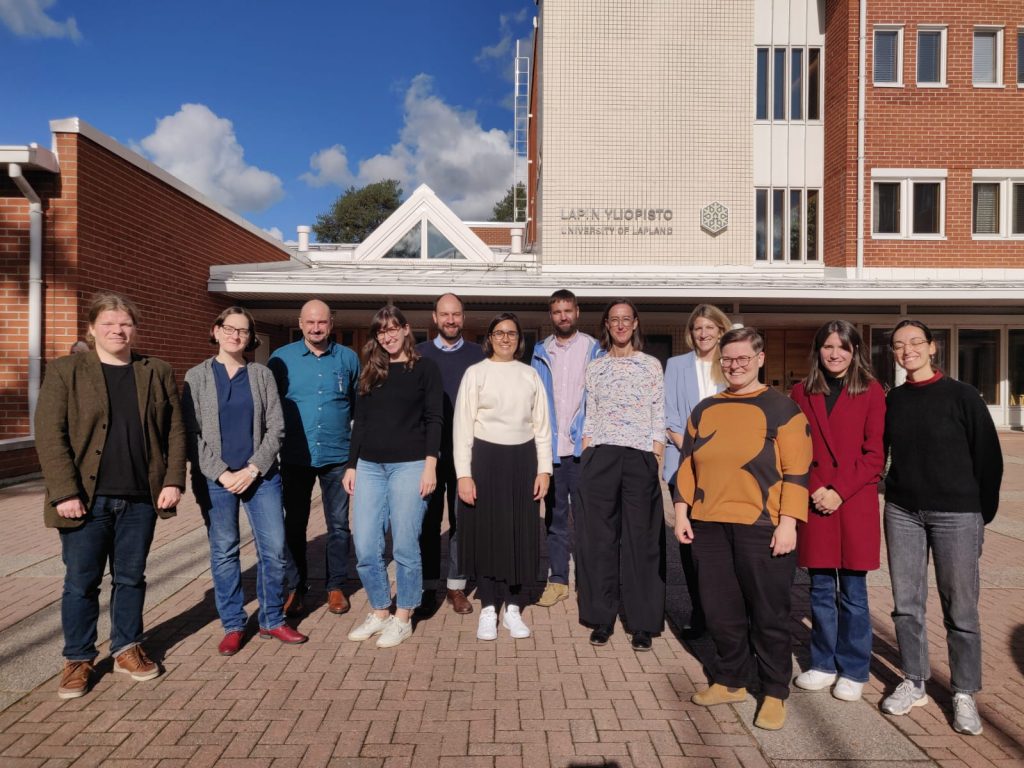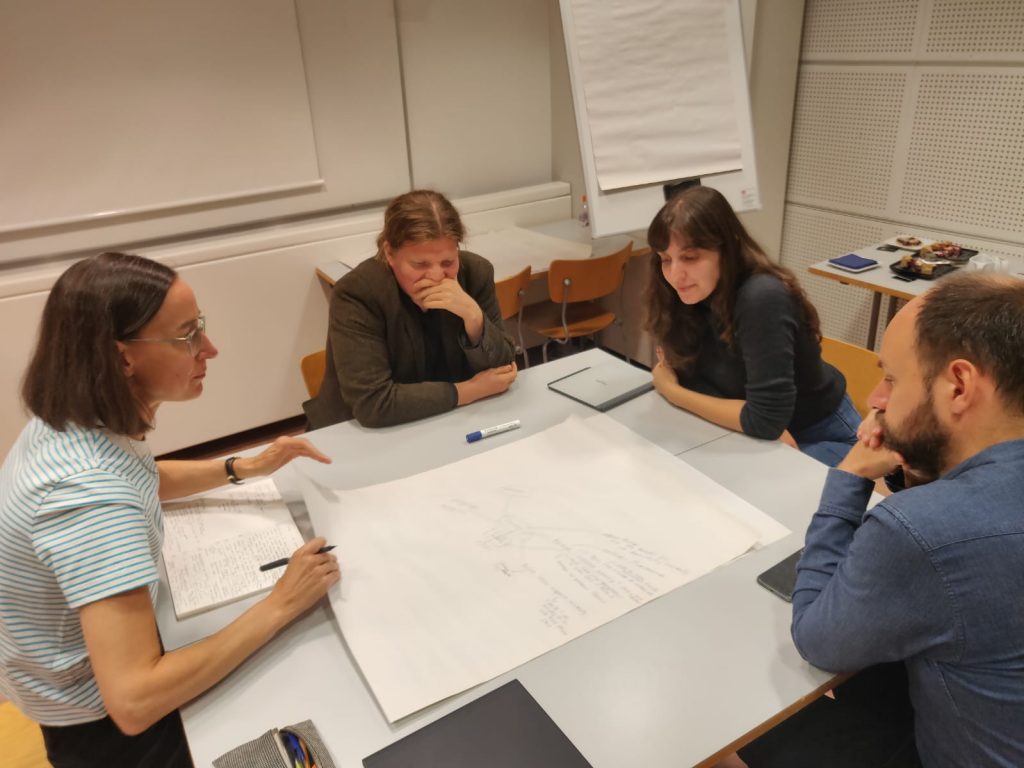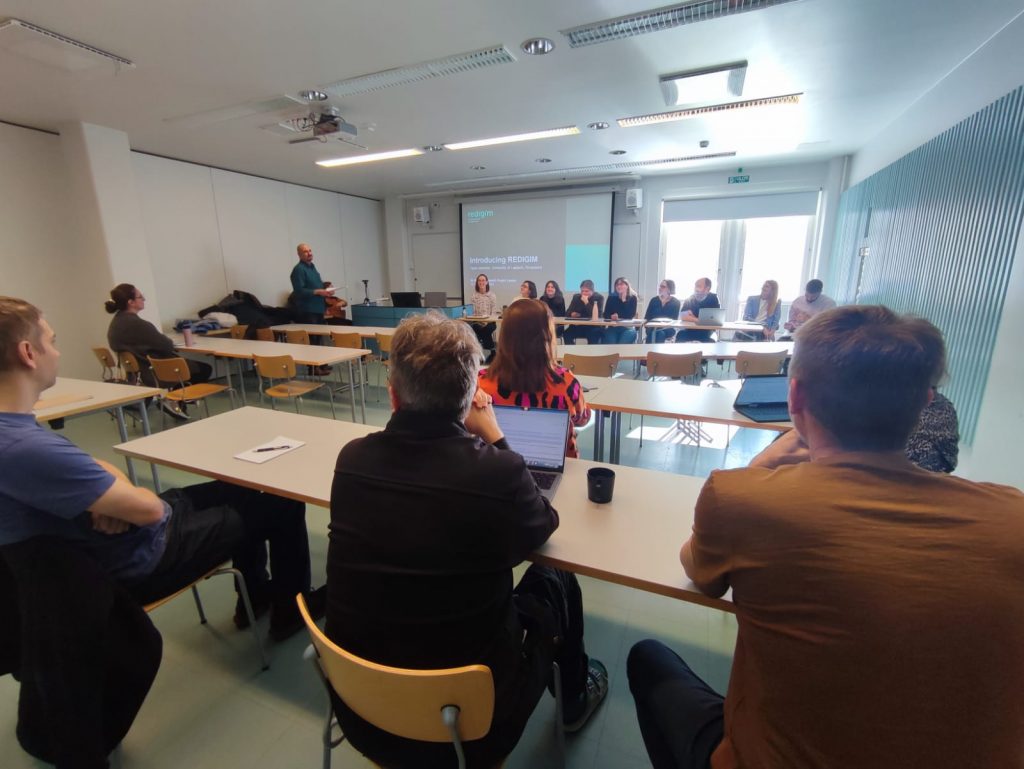
NEWS


NEWS
Published
Maria Castellví (PhD candidate at the University Pompeu Fabra) reflects on the first consortium meeting held on 12-15 September 2023 in Rovaniemi, Finland.

Rovaniemi is the capital of Lapland, Finland’s northernmost and largest province, right on the Arctic Circle. It’s a university town surrounded by dense arctic forests, lakes, and rivers. This was the setting chosen for the first consortium meeting of the ReDigIm research project, which took place from the 12th to the 15th of September at the University of Lapland. It was the first in-person meeting of the project and an excellent opportunity to get to know each other better and exchange outcomes and impressions after the first months of intense work.
The five national teams participated in the meeting: Dr. Rebecca Bramall and Dr. Jonathan Paylor (University of the Arts London, UK), Dr. Moritz Ege and Dr. Lara Gruhn (University of Zurich, Switzerland), Dr. Čarna Brković and Dr. Milana Cergic (Johannes Gutenberg University of Mainz, Germany), Dr. Mercè Oliva, Dr. Isabel Villegas and Maria Castellví (University Pompeu Fabra, Spain), and the hosts, Dr. Janne Autto and Dr. Keijo Lakkala (University of Lapland, Finland).
The first day started with a morning session led by the postdoc researchers of each national team, with the objective of sharing the preliminary outcomes from the project’s first work package. This first phase explores public debate about redistribution in each of the five countries, focusing on the press’ representation of different redistributive mechanisms (including taxation and charity) and the values and meanings ascribed to digital technology. It was a great opportunity to better understand the contextual specificities of each case and to identify similarities and differences in the use of concepts such as solidarity or reciprocity.
After lunch, there was a working session led by Dr. Rebecca Bramall with the aim of synthesizing the main outputs from each national team. All the consortium members engaged in a very fruitful discussion about the opportunities and challenges of doing comparative studies or contextualized analysis. The second half of the session focused on disseminating the first working package results and planning potential topics for publications and presentations.

To close a very intense and productive first day of meetings and working sessions, we had the chance to get a grasp of Lappish culture by visiting Artikum, a museum and an Arctic Science Center. There, we learned about historical events and the impact of the Second World War, customs and traditions of the people that have populated Lapland for thousands of years, such as the Sámi people, as well as the unique natural conditions that define its astonishing arctic landscapes, such as the northern lights, the polar night and the midnight sun.
The second day started with an introduction to work package 2, which will involve the teams analyzing digital platforms (such as crowdfunding webs and apps) that enable people to donate money to others and contribute to social causes. Dr. Mercè Oliva provided an overview of the analysis protocol, which was tested by the rest of the researchers through a practical exercise. The protocol draws on social semiotics to analyse how platforms shape and build discourses through its design and interaction features. The analysis includes paying attention to the overall structure and content of the platforms, the meanings conveyed by visual elements, the affordances and socio-technical features and gamification strategies. The analysis of the platforms will be complemented by interviewing the people responsible for the platforms and the designers. In this regard, after finishing the group exercise, Dr. Čarna Brković led a workshop about conducting interviews for research purposes, inviting the rest of the team to participate in an open conversation and to share previous experiences with this technique. Some of the issues discussed included ethical considerations, the difficulties of accessing participants and the power dynamics that shape the relationship between researcher and interviewee.

The last part of the day was dedicated to knowledge exchange and transfer. First, each national team presented the context and main outcomes of the research conducted so far in an open seminar that professors and researchers from the Faculty of Social Sciences attended. Anna Rajavuori (from Kalevi Sorsa Foundation, a Finnish cooperation partner of ReDigIm) also presented at the seminar.
Rajavouri also participated in the second and last activity of the afternoon, which consisted of a knowledge exchange workshop led by Dr. Rebecca Bramall. During the session, we got familiar with the concept of knowledge exchange, defined as ‘a collaborative process, creative endeavor that translates knowledge and research into impact in society and the economy’. We worked with a theory of change model, which helped us to think outside of the box and identify the connections between the activities and the resources of a project and the desired impact. Drawing on this model, all team members engaged in a group exercise focused on identifying relevant stakeholders for the project and, simultaneously, imagining the long-term changes we want to achieve with ReDigIm. Some of the key concepts that emerged from the brainstorming were ‘democratization’, ‘equality’, ‘solidarity’ and ‘regulation’. At the same time, these main concepts turned into interrogations: How can digitalization help democratize redistribution practices? In which ways could digital platforms be regulated to guarantee equality? Could these ideas be translated into specific policies?
We left the room with many questions in our heads that will serve as a guideline for the future steps of the project. The next consortium meeting will take place in Barcelona in April 2024.